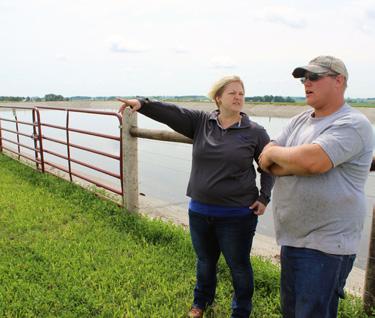
4 minute read
Will Brockliss, Center for Culture, History, and Environment
Director’s Cut
Meet Will Brockliss, the new director for the Center for Culture, History, and Environment.
Photo credit: Jeff Miller/University Communications
I am writing to introduce myself as the new director of CHE. It is a very great privilege to take over responsibility for an organization that plays such a vibrant role in the life of the Nelson Institute and the university, which exists at the cutting edge of interdisciplinary research in the environmental humanities, and which has been so important to me, personally, in my time at the UW.
The pandemic was difficult for CHE, which is based so markedly on a strong community ethos and on getting out there into the world. But director Anna Andrzejewski and assistant director Rachel Gurney did a wonderful job guiding us through these challenging times. In the last academic year, we returned to in-person events, with a highly successful graduate symposium and social gatherings in Tenney Park and Allen Centennial Gardens. We were also extremely happy — and relieved! — to be able to hold the PlaceBased Workshop again, after a two-year hiatus. Our visit to Blackhawk Island in the Wisconsin Dells and to important locations in the corridor between the Dells and Madison was a tremendous success. The end of the semester, however, was tinged with sadness as we said goodbye to a founding member and stalwart of CHE, Bill Cronon. We wish him all the very best for his retirement and thank him for all he has done for CHE.

— Will Brockliss
As we emerge from the pandemic, we have the opportunity not only to reestablish our regular roster of events and projects but also to reimagine how we can deliver them. Given the focus of our organization, I think it’s especially important that we consider opportunities to strengthen our commitment to environmentally responsible research and teaching. The pandemic forced us to innovate in creating new platforms for virtual collaborations: online conferencing tools enabled us to continue our series of monthly colloquia; the recent graduate symposium took place in a hybrid format. There is no reason we cannot continue to develop such models in subsequent years. Going forward, online or hybrid events — alongside in-person colloquia and gatherings — have the potential to connect the CHE community with scholars across the country and globally.
But that’s just one idea of the many we might pursue, and I’ll look forward to hearing from you about your own visions for CHE. Please don’t hesitate to contact me also if you’d like to know more about CHE, our plans for 2022–23, or opportunities to get involved — or indeed if you’d just like to chat. I’m looking forward very much to working with you and the rest of the CHE community in the coming academic year.
Will Brockliss Sing, O Muse!
Brockliss’ background is Homeric poetry — yes, that Homer of The Iliad and The Odyssey, who is known for elaborate similes, most of which are similes of the natural world. “I started thinking about how we could look at these similes as particular responses to particular environments,” Brockliss explains of how Homeric poetry and environmental studies intersect, “and how they were using those characteristics to talk about the sorts of things that were going on, particularly in warfare.”
Forward, with a Backward Glance
A big question that’s been vexing Brockliss is how to use ancient history and culture to address the current climate crisis. “Do we look to earlier phases of human history to identify the origins of our current problems, either in harm that was carried out to the environment in those times, or in the deleterious attitudes that people developed in the past and that have been carried on today? Or,” he punctuates, “do we instead look back to earlier points In history as examples of eras of actually more responsible attitudes to the natural environment,” he asks. “How do we use knowledge of the ancient world to give us some perspective on the modern crisis?”
A Foreshadowing Intro
Brockliss and Nelson may have been meant to be. His first introduction to the Nelson Institute was through a faculty seminar, which just so happened to be put together by the folks in CHE. After that, he started attending the weekly CHE lectures … which just so happened to be in the building adjacent to his office. “I’m now in the very unfortunate position of having a full five-minute walk to where CHE is now based,” he chuckles.
In with the Old, in with the New
“So many of the virtues of CHE I want to keep in place and maintain and keep the vibrancy of, such as the CHE Environmental Colloquia, the Place-Based Workshop, the graduate symposium — all of these things are really important to what CHE does,” Brockliss says as he steps into the director’s seat. But there are some new aspects Brockliss hopes to introduce: “The experience of the pandemic sort of provides us with some opportunities — it’s kind of unpleasant to put it that way — to rethink things. I think part of that, particularly for an environmental organization, is to rethink our environmental stewardship” — particularly, he notes, through hybrid opportunities that can virtually connect students to others across the globe — “which at the same time can reduce our carbon footprint.”










